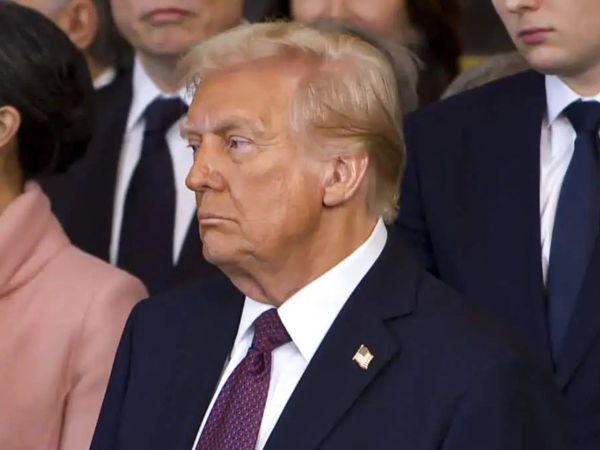
New York: Indian-American members of the US Congress and the diaspora community criticised the reciprocal tariffs imposed by President Donald Trump, calling them “reckless and self-destructive”, urging leaders in both countries to engage in dialogue to address these challenges.
On Wednesday, Trump imposed a 26 per cent “discounted reciprocal tariff” on India. While making the announcement, he said, “India charges us 52 per cent so we will charge them half of that – 26 per cent.”
President Trump, in a historic measure to counter higher duties on American products imposed globally, announced reciprocal tariffs on about 60 countries.
The lawmakers also said that Trump’s tariffs will likely make Indian goods less competitive.
Congressman Raja Krishnamoorthi said Trump’s blanket tariffs are a tax on working families so that he can cut taxes for the wealthiest Americans.
“These latest so-called ‘Liberation Day’ tariffs are reckless and self-destructive, inflicting financial pain on Illinois at a time when people are already struggling to keep their small businesses afloat and put food on the table.”
Krishnamoorthi, a Democratic lawmaker from Illinois, said the tariffs isolate the United States on the global stage, alienate America’s allies, and empower its adversaries – all while forcing America’s seniors and working families to bear the brunt of higher prices.
Urging Americans to call on Trump to end his “disastrous” tariff policies before he sends the country into a recession, Krishnamoorthi said the tariffs do nothing to strengthen the American economy or national security.
Congressman Ro Khanna said in a video posted on his social media handle that the tariffs announcement “isn’t an April Fool’s joke.
“Trump is literally trying to destroy our economy with his Liberation Day tariffs slapped overnight, no strategy, no consultation, no congressional input.
“What does this mean? Prices are going to go up. Prices for cars are going up. Prices for groceries are going up. Prices for home repairs and home building are going up, and there’s total uncertainty,” Khanna said.
He added that businesses don’t know whether to invest, the stock market is down and “people are saying we could have a recession. We could have stagflation, meaning slow growth and higher inflation, all because of Trump’s incoherent, incompetent economic policy.”
Indian-American Congressman Dr Ami Bera said in a post on X “Let me be clear: these tariffs will not make America wealthy again. These costs will be passed onto YOU— the American consumer. This is not a tax cut. This is a tax hike.”
Former advisor to President Joe Biden and Co-Chair for Economic Subcommittee for Asian American and Native Hawaiian/Pacific Islander (AANHPI) Commission Ajay Bhutoria told PTI that Trump’s ‘Liberation Day’ initiative imposes a 26% reciprocal tariff on India’s exports to the United States, alongside new tariffs on imports from China, Mexico, Canada, and Japan, significantly impacting both nations and beyond.
“This sweeping policy will likely make Indian goods—such as textiles, and pharmaceuticals—less competitive, while tariffs on other major trading partners will drive up the cost of automobiles, groceries, medical supplies, and countless other products, hitting American consumers hard with an estimated additional $2,500 to $15,000 in annual expenses.”
Bhutoria said India’s key industries face declining export volumes and financial strain, threatening millions of livelihoods and potentially weakening the strong US-India economic partnership, while American households grapple with rising prices for everyday essentials.
“This decision injects market uncertainty and risks disrupting global supply chains, possibly pushing Japan, South Korea, India and others to diversify markets or pursue countermeasures.”
He urged leaders in both countries to engage in dialogue to address these challenges, “minimising the burden on American consumers and Indian producers alike, and preserving the collaboration that has long driven innovation and prosperity between our nations.”
Asia Society Policy Institute Vice President Wendy Cutler said the reciprocal tariff rates will come as a “shock to our trading partners” and will cause harm to the US economy with higher prices, slower economic growth, and slowed down business investment.
“Our close partners appear to be treated similarly to our rivals, with China’s reciprocal tariff rate just a tad higher than Taiwan. This is difficult to understand given Taiwan’s open economy and extensive manufacturing FDI projects in the United States,” she said.
Cutler added that America’s Asian FTA partners were not spared with Korea’s rate at 25 percent at the high end of the group. Asian countries in particular have been hard hit causing them sharp economic pain given their export-driven economies.
“While the President has underscored that he could have charged a lot more, our partners will not view his actions today as “kind.” Our partners will now be under domestic pressure to respond while helping their firms weather this storm,” she said adding that “We can expect global economic growth to start plummeting as trade flows decline, prices increase and businesses put off investments.”
“Foreign delegations are likely to be all over Washington trying to secure exceptions. We can expect the use of IEEPA (International Emergency Economic Powers Act of 1977) to justify these actions being challenged in courts,” she added.